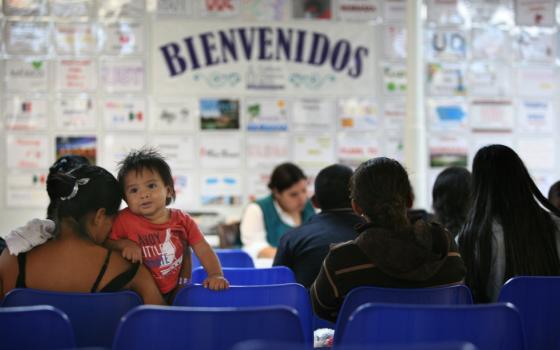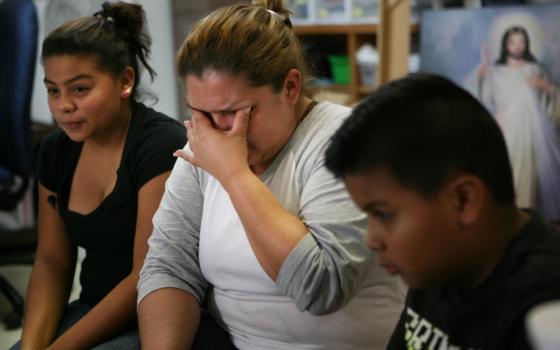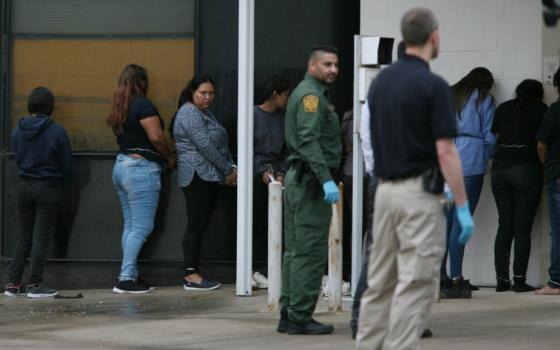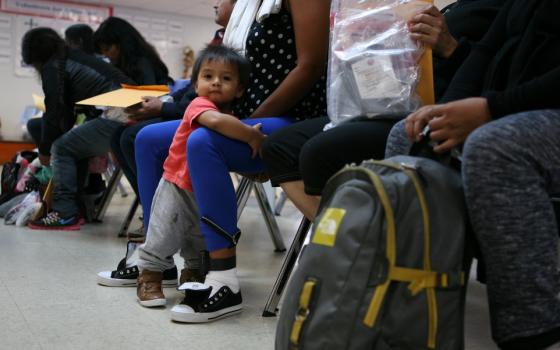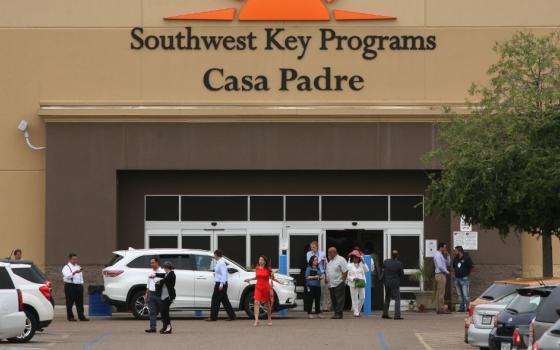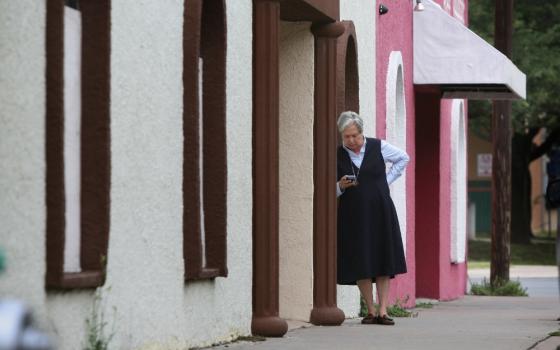Sr. Norma Pimentel: "It's wrong to use the pain of a child."
The journey was long and hard. For 15 days and roughly 1,443 miles, Cristina Melgar and her two children traveled by bus and truck to get from El Salvador to the Texas border. Finally on a raft that deflated while crossing the Rio Grande, they made it safely to shore.
But the smugglers, whom she described as "muchachos endrogados" — drugged up guys — demanded more payment. They had already taken all she had. When she couldn't pay, they struck her daughter's leg and a struggle ensued. She and her children managed to escape, she said, and walked two hours until they found a border patrol agent near McAllen, Texas.
She thought she had reached safety in the United States. "Help me," she said, and turned herself in. After her 16-year-old daughter was taken away in an ambulance because of her injured leg, Melgar and her son were transported to a processing center where he was separated from her.
"They just take them; they don't tell you anything," Melgar said wiping away tears, in the Humanitarian Respite Center, a shelter established and run by Catholic Charities in the Rio Grande Valley. "I had never been separated from my children."
More than 2,300 immigrant children have been separated from their parents after Attorney General Jeff Sessions announced a zero-tolerance policy for border crossers, according to Department of Homeland Security statistics. If they crossed illegally, instead of at a point of entry, they faced criminal prosecution and their children could be placed in the custody of the Office of Refugee and Resettlement.
Images of children huddled under aluminum blankets in pens surrounded by chainlink fencing sparked outrage among the public and politicians, both Democrat and Republican. U.S. bishops, women religious communities and other religious leaders condemned the policy, with many mobilizing to help end it with petitions and protests. As pressure mounted, President Donald Trump on June 20 signed an executive order ending the separation policy after weeks of delay and blaming Democrats for refusing to negotiate on immigration legislation. It was not clear when parents currently separated would be reunited with their children.
"I've seen that child's face — I've seen those tears, and it just breaks my heart," said Sr. Norma Pimentel, executive director of Catholic Charities of the Rio Grande Valley and a sister with the Missionaries of Jesus. Pimentel helped establish the respite center in 2014 to tend to the needs of immigrants after their large numbers overwhelmed immigration officials.
Now reunited with her children, Melgar waited at Pimental's center for transportation vouchers to join other family members. She said she had came to the U.S. after gangs threatened her daughter's life. Her daughter, Aracely Abarca Melgar, described her days in a chainlink enclosure dubbed "la perrera" — the dog pound — because it resembled dog kennels.
"It was like a big cage," she said. "It was a horrible place and you can't sleep. I was cold." In some enclosures, children ranging in age from 2 to 5 cried for their parents all day, she said. "Don't cry," Aracely tried to console them. "They're fixing their papers. Soon they'll come." The worst part for the teen was when she walked to the bathroom and passed her 10-year-old brother's enclosure. She often saw him crying. "We're going to get out," she told him through the fence. "We're going to be with Mom." But officials waved her away and scolded her for talking to her brother, she said. It would be six days before they rejoined their mother last week.
The Customs and Border Protection agency disputed the ages of the children in Aracely's account. "CBP does not separate those under age 5 from their parent, except in cases where familial relationships are in question, there is another crime involved, or for the medical needs of the child, " a CBP spokesperson said. "Insufficient detention space to accommodate a family unit where both parents are present," is also a factor.*
Critics were still unsure about the executive order. "It remains to be seen how the president intends to resolve this," U.S. Rep. Zoe Lofgren**, a California Democrat said in a statement. "If his plan is to put parents in the cages with their children, that's simply trading one form of abuse for another."
Getting in and out of court
The harsh reality of the "zero tolerance" policy played out in courtrooms near the border. At the federal courthouse in McAllen, 85 immigrants in Judge J. Scott Hacker's courtroom stood in unison and raised their hands to be sworn in on June 18. They had come from El Salvador, Mexico, Guatemala, Nicaragua, Honduras, Venezuela and Peru. As they rose, the jingle of leg irons on those who had previous convictions for illegal entry or other offenses rattled the room.
Now, all pleaded guilty to illegal entry. The judge then explained that he would ask questions to the whole group. "When it's your turn, and I point to you, answer 'yes' or 'no' loudly," he said, as immigrants listened through headsets to his words in Spanish.
"Have you understood the instructions?"
"Sí, sí, sí, sí," the responses came out in a row down the line as he pointed at each immigrant.
Among the group were 20 defendants who Azalea Aleman Bendiks, the assistant federal public defender, said had been separated from their children.
Angela Antunez-Mena's 5–year-old daughter had been taken from her two days earlier at the border. "If my sentence were to mean that I was going to be deported, what would happen to my daughter then?" she asked through an interpreter.
"Ms. Antunez, unfortunately I am not an immigration attorney and I'm not an immigration lawyer," Hacker said. "The only thing that I can tell you is that when you finish with this illegal entry, which is considered a criminal case, or a criminal allegation against you, you're going to go over to immigration, and hopefully they have procedures in place that will marry you up with your daughter."
In the hearing, Aleman Bendiks said that Antunez-Mena and others were in expedited removal, which meant they could be deported quickly by low-ranking immigration officers. "We are hoping that they get their asylum claims heard, so they are not removed apart from their children," she said. In the next row, Ada Tejada Sandoval's 14-year-old daughter was also separated from her. "Her husband was murdered in El Salvador, and she was escaping the threats against their life," the public defender, said.
For those who pled guilty and did not have prior entries, the judge gave them a time served sentence, a $10 cost assessment and 14 days to appeal. They still faced the complicated process of navigating U.S. immigration rules, asylum hearings and the threat of deportation. After the hearing, Aleman Bendiks confirmed that she and other attorneys had met with each of the immigrants prior to the hearing.
The next morning in the same courthouse, 74 more migrants, 74 more guilty pleas.
'Asylum trumps the illegal entry statute'
"There is a statute that penalizes illegal entry, however there's also asylum law that gives people the right to seek protection in this country," said immigration attorney Sara Ramey, the executive director of the Migrant Center for Human Rights. "The actual conviction for illegal entry in no way should affect a person's ability to have an asylum claim."
Furthermore, she said, just because an immigrant does not enter the country at an official point of entry, such as a border bridge, that does not negate their right to claim asylum. "The right to asylum trumps the illegal entry statute," Ramey said.
Asylum-seekers are given little choice but to enter illegally said Sr. Denise LaRock, the volunteer coordinator for the Interfaith Welcome Coalition in San Antonio. A Daughter of Charity of Saint Vincent de Paul, she had come last week to McAllen with Lenna Baxter, another coordinator, after hearing that U.S. border agents were stopping people midway on the bridges to prevent them from entering the U.S. to ask for asylum. LaRock and Baxter met a Honduran family trying to enter.
At the midpoint where the U.S. and Mexico meet, border agents stopped the group, checking for U.S. passports and visas. "So if you don't have that, then you can't even get on to the U.S. side of the border" to claim asylum, LaRock said. The agents denied entry to the family, saying the immigration processing center was full and the wait would be several hours. When LaRock and Baxter asked if the agents would let the family wait in the air-conditioned building to get out of the heat, the request was denied.
"When we went through the American side, there's only like six people in the waiting room for immigration," said LaRock.
"It's an international law that people can ask for asylum, and yet families are not getting due process," she said. "We can work out due process without separating families — who knows how badly these children will be scarred, and the mothers, too."
Amid rising public outcry, both Democrat and Republican lawmakers found themselves in agreement that the family separation practice had to go. A group of Democratic lawmakers demanded access to Casa Padre, a former Walmart in Brownsville that housed many of the children. As one group of lawmakers toured on Monday, reporters were kept behind barricades.
Providing some care
Across the state, Jesuit Fr. Rafael Garcia, associate pastor of Sacred Heart Parish in El Paso, focused on practical and spiritual ways to help. At Annunciation House, a residential shelter for immigrants recently released from detention, Garcia makes phone calls to get bus and plane tickets that will reunite relatives with their newly released loved ones. "We talk about family values all the time, but it's unfortunate that the way that the government is seeing, it seems we want family values only for U.S. citizens," he said.
As the priest who ministers to immigrants in three detention facilities, two which are for minors, he said he prays with the children and celebrates Mass. "There's no doubt that they're in a moment of suffering and distress and they're praying for strength and for their families," Garcia said of the adult immigrants in custody. He worried about the long-term effects the trauma would have on the younger ones. "These kids that are 5, 6 years old, they're cared for and all, but they're there by themselves."
Back at the respite center in McAllen, news teams from Norway, Italy and the U.S. stood in line to interview Pimentel while trying to make sense of the Trump administration's policy. The demand for her time was so great that volunteers had to limit her media exposure. "She's exhausted," they said.
Amid the bustle, Pimentel reflected back on the 1980s when border agents called her convent to see if the sisters could care for an immigrant family. "Border Patrol was extremely caring about the family and the children and making sure they were at a place they could be together."
Despite the harshness of reports coming from her immigrant visitors, she still said the relationship with border agentsl and ICE is "very good." She planned to have coffee that afternoon with Border Patrol Sector Chief of the Rio Grande Valley, Manuel Padilla Jr., who checks in from time to time to see what she needs or hear her concerns.
"As far as how the government has proceeded to handle this — this is the worst thing I've seen," Pimentel said. "It's wrong to use the pain of a child, the suffering of a family to deter another family from coming. I think it's totally unethical; it's immoral; it's cruel and it should not happen."
When asked if she thought the policy had deterred people from coming, Pimentel hesitated. "It doesn't look like it is," she said. "I think that if it was, it would have already stopped, but they're still coming in great numbers."
A few hours later, a bus dropped off a group of around 20 immigrants at the respite center. They raced for the doors in the pouring rain and took a seat in the blue plastic chairs while they waited to be assisted by volunteers. Less than an hour later, another group of about 15 came through the glass doors. Another group followed, and then another — averaging about 100 a day. Pimentel was right. They were still coming in great numbers.
* This story has been updated to name the CBP agency as Customs and Border Protection. The CBP agency hires and manages border patrol agents.
** An earlier version of this story misspelled Lofgren's first name.
[Nuri Vallbona is a freelance documentary photojournalist. She worked for the Miami Herald from 1993 to 2008 and has been a lecturer at the University of Texas and Texas Tech University.]
